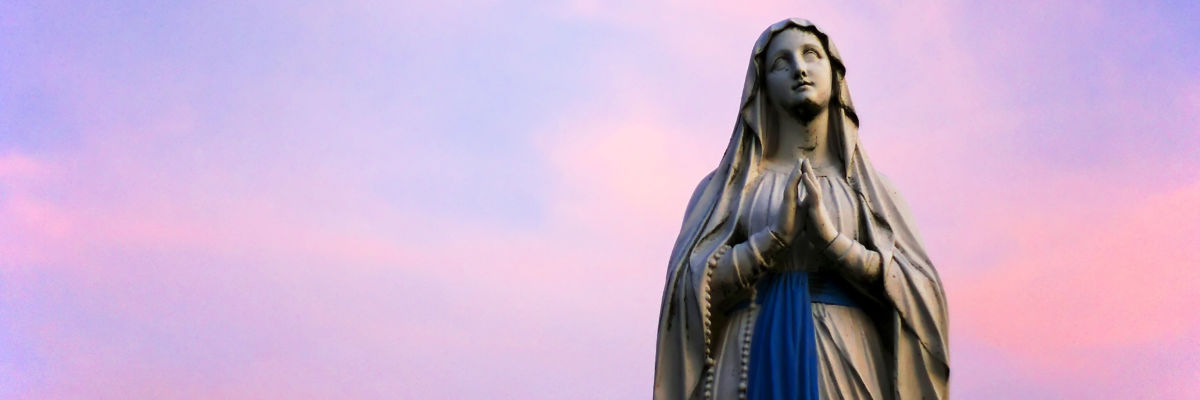
William Albrecht andCy Kellett discuss when the church first started venerating Mary.
Transcript:
William: When you look into the early church, those men and women that walked and talked with the apostles were taught and trained by them that knew the bodily risen Lord. They believed things about Mary that today as Catholics, we believe. They believed Mary was perpetual virgin. They believed Mary was all immaculate, all holy. And by the time you get to a period in the early church when they’re wondering, okay, how did Holy Mary end her life? And people begin to ponder about it, they come back with a very clear liturgical reply that being at the end of Holy Mary’s earthly life, she was taken body and soul into heaven by our Lord.
And when you look in the early church, brother, it is mind-blowing how you find these beliefs. So if you lived back then before the biblical canon was even talked about, if you lived back then and you went to church, it didn’t matter where you went to church. Every church would have been preaching these things about Holy Mother Mary from the pulpit.
Cy: So would that have involved prayer? Like, are there ancient prayers to Mary or ancient invocations of Mary?
William: Yeah. Now we have a very early one which is dated around to maybe the second or the third century, that very often it’s not talked about a whole lot. You can find that in what is called, very typically called the Sibylline Oracles. Now, those have what we call Christian interpolations, meaning that does come from the early church, that is officially from people that are believers. But then we have one that is very popular called the Subtuum Praesidium. That one is incredibly popular. That one will get dated probably to around 250. Now, that one is an incredibly early one. And that shows you that the early church, right away from the very earliest times, they were praying to Mary, they were invoking Holy Mother Mary. And you find that very early on.
The incredible thing, brother, you look in the early church, and they never had any issue invoking Holy Mother Mary and praying to Holy Mother Mary to guide them and to draw them closer to her son.
Cy: That Subtuum Praesidium, to me, it reminds me of what we pray now as the Hail Holy Queen. It’s not the same prayer, but it has the same kind of feel to it that I fly to your protection and I seek your help. Do you have the same sense about that? It sounds kind of like what we say now. It’s short. I don’t know if the two prayers are related, but it has this very motherly appeal for protection and help.
William: Yeah. And the incredible thing about that, brother, is that if you look in the early church. And right now I’m working on a book that I hope to release within a year or two on Mary on the Immaculate Conception. So I’m doing a lot of work on that particular prayer. And you find that right around the time that that prayer is dated to, you have early church fathers utilizing a very similar prayer to Mary, which tells me maybe they’re gathering from there, because you’ve got a lot of prayers that are almost verbatim with a few words taken out of order, meaning that prayer must have been utilized liturgically in church services if you have early fathers virtually reproducing it. So that, to me, does tell you a lot.
Cy: Oh, yeah. Like when we read in St. Paul about the consecration of the body and blood, the bread and wine, you go, oh, well, that’s not Paul writing that. Paul’s giving me a quote of something that everybody. He’s saying the words that everybody already knows at that point, without a doubt. So you’re saying that’s the case with the Subtuum Praesidium, that when we see it quoted, we shouldn’t say this person is inventing this prayer. The evidence of it, because it’s in different sources, is this is a common prayer that people are praying.
William: It was a common prayer. You’ve got it. You find it virtually worded in many different fathers, and then you get to a time later in history where it pretty much is built into the liturgies of various different churches. And that, to me, tells you a lot. When you find it in various different languages, that tells you, okay, the early church was utilizing it to pray to Holy Mother Mary. Now, what does that tell you? If you read the prayer, it shows you that the early church was praying to Holy Mother Mary, recognizing Mary as Theotokos, as the God bearer, meaning the people that were praying to her recognized our Lord as almighty God.
Cy: Yeah, but the other thing about that prayer, though, William, is it’s not a prayer like you would make to God. There’s no confusion here. Like, there’s not a theological confusion, a kind of divinization of Mary. It doesn’t sound like I praise you and I adore you, and you know the kind of things that we say to God. It sounds like you’re asking a very high person for their help.
William: And the incredible thing, Cy, is that in the early church, from the very beginning, they were able to make that kind of distinction. Now, what do I mean? I mean that all the while they could refer to Mary as all Immaculate, as perpetual Virgin, as all holy, all the while they did that, they realized in the early church they were venerating a creature, now the greatest of God’s creations. But they recognized worship was due to God and God alone. And you had that from the very beginning.
Today, our evangelical friends very often do not realize that we are giving Holy Mother Mary veneration because we’re told to do it in the Bible. Now you’ve got it in the inspired word of God, our Holy Mother Mary tells you in a prophetic kind of tone, all generations will call me blessed. Well, if you look today in 2025, very clearly in the Catholic Church, we do give her that due honor that she is due. And unfortunately, I cannot repeat the same for all of our evangelical friends. A lot of the times they are really very hesitant to give the honor due to Mary that she truly is due.
Cy: Our guest is William Albrecht. You can find his work at patristicpillars.com. If you’ve got questions about Mary, it does not have to be about what we’ve been discussing. It could be anything about Mary. If it’s a challenging question, that’s fine. If it’s a curious question, that’s fine. 888-318-7884.



